
Come summer time, the thermometer isn’t the only thing trending upwards. The humidity levels also start to climb. While it can have an influence on your comfort level, humidity can also cause damage to your home.
If you live in the Northeast, you live in an especially humid part of the country. In states from Pennsylvania to Maine, the average humidity in July exceeds 80%, according to Current Results. As a point of comparison, the average humidity out West in places like Colorado usually falls in the 50% range. Additionally, according to dengarden, optimal humidity is between 30% and 50%.

Luckily, there is plenty you can do as a homeowner to lower home humidity. Not only will this improve your quality of life and comfort, but, if you successfully dehumidify your home, you will see energy savings while combating mold and spores.
That’s why we’re putting this guide together on how to reduce humidity in your home. We’ll go into details on why reducing humidity is so important while also spelling out some the most effective ways to accomplish the goal.
Health & Financial Benefits of Lower Home Humidity
Before we go over concrete ways to reduce humidity, let’s take some time and explore the many financial and health benefits of a dehumidified home.
- Mold and spores. While mold and spores are especially hard on allergy sufferers, certain molds can be a health hazard for all people. In fact, many people don’t realize they have a mold problem until they start to experience the many symptoms of mold infestation. Mildew, especially in bathrooms and on curtains, can become a serious problem, causing damage to fabrics.
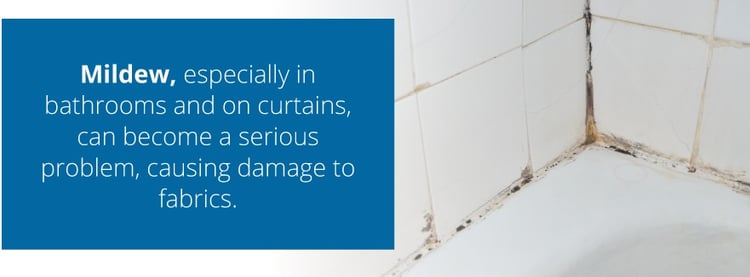
Undoing the damage caused by mold and mildew can be expensive. Simply covering it up with a new coat of paint doesn’t solve the problem, it only hides it. The necessary chemicals for treating a mold problem can be harsh and difficult to work with. It is much easier to avoid the problem rather than trying to fix it after the fact.
- Rust and corrosion. While drywall and fabrics are susceptible to mold and mildew, metal fixtures can be damaged by rust and corrosion. Just like rust on your car, once it starts, it can be hard to combat. The fixture will either need to be treated with an anti-corrosive agent or will need to be replaced.
Again, rust is a much costlier thing to address after it has reared its head than addressing the causes before it appears.
- Wood swells and warps. Have you ever noticed your interior doors don’t close as well during the summer? That’s because, in a more humid environment, wood will absorb moisture and swell. In many cases, this is an annoyance. You might end up waking up your family at night as you quietly try to enter your room and go to bed.
However, the damage caused by swelling wood can be more serious. Hardwood floors can start to pull up from the beams they are attached to while cracking drywall as they warp. The wood may return to its proper place once the summer is over, unsightly cracks will remain.
- Drywall shows water damage. Even if your drywall doesn’t become moldy, it can still suffer from visible water damage if your home is overly humid. Much like the ring left by a leaky pipe, pristine white ceilings can become yellow, and paint might start to chip.
- Sleep apnea sufferers’ symptoms worsen. Many people don’t realize the most common causes of severe snoring and sleep apnea are made worse by humidity. Because these sleep problems are often caused by the relaxation of the soft palate, humidity exacerbates the effects.

Sleep apnea does more than simply annoy your sleep partner with loud snoring. It is a contributing factor for obesity and heart issues. Plus, sleep apnea sufferers get little rest at night, meaning they are often sluggish during the day.
While lowering humidity won’t solve sleep apnea issues, it will help as part of a larger treatment plan.
- Hinders sweat evaporation. Sweating is the key to your body’s cooling system. As your perspiration evaporates, your skin cools. However, in a humid home, your sweat doesn’t evaporate nearly as easily. As such, you will feel sticky, and your sweat won’t cool you down.
While this isn’t a health concern, it is uncomfortable, unsightly and can lead to an increase in body odor.
- Your home feels hotter. If you live in the northern New England, there’s a good chance you don’t have air conditioning. However, the summers can still get quite warm, and a humid home will only make it feel warmer. Just as wind chill measures how cold it feels when the temperature is combined with the ambient wind, heat index measures the combination of heat and humidity.
While you can’t do anything about the heat index outside, you can take steps to reduce the warm feeling inside without investing in central air conditioning.
 Damage hides in crawl spaces. The damage caused by humidity is often limited to places where you rarely go, such as small storage areas and crawl spaces. Remember, just because you don’t see the damage day to day doesn’t mean that it isn’t causing a problem.
Damage hides in crawl spaces. The damage caused by humidity is often limited to places where you rarely go, such as small storage areas and crawl spaces. Remember, just because you don’t see the damage day to day doesn’t mean that it isn’t causing a problem.
To begin with, crawl spaces are often used as storage areas. Maybe that’s where you keep a trunk full of your winter sweaters. Do you want to pull your sweaters out in autumn only to discover they are covered in mold and mildew? Or maybe you have some special and expensive tools you only use on certain occasions stored there. When it’s time to tackle that important job, your tools may become ruined by rust.
Either way, tackling humidity will make your crawl spaces better for storage. You won’t have to worry about the items in your crawl space. Whether they are there because they are only used on occasion or because they hold too much sentiment to be exposed to everyday living, a humid crawl space can hurt them.
How to Lower Humidity With Small Changes
Now that we’ve demonstrated just how important reducing humidity is, what can you do?


This work is licensed under a Creative Commons Attribution-NoDerivs 3.0 United States License.
Luckily, there are many changes — both minor and major — you can make to your home and lifestyle that will address the issue. Let’s start with the small changes
- First and foremost, humidity becomes more problematic when the air in your home isn’t moving. If you can open your windows, do it! This will allow a cross breeze to develop, helping more humid air in your home circulate out.
Using your various ventilation fans, especially in your bathroom, can help this. They aren’t just there to keep your bathroom window from steaming up. They pull the extremely humid air originating in your bathroom or kitchen out of your home and vent it outside.
If you don’t have proper ventilation fans in your bathroom, crack a window whenever you are showering. That way, you can get the air moving without sacrificing privacy.
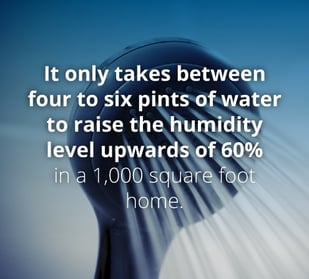 Shorter showers. One of the biggest culprits of home humidity is the steam coming out of your shower. The longer the shower, the more steam. More steam, more humidity. Consider this statistic from Critical Cactus: it only takes between four to six pints of water to raise the humidity level upwards of 60% in a 1,000 square foot home.
Shorter showers. One of the biggest culprits of home humidity is the steam coming out of your shower. The longer the shower, the more steam. More steam, more humidity. Consider this statistic from Critical Cactus: it only takes between four to six pints of water to raise the humidity level upwards of 60% in a 1,000 square foot home.
Your washing machine is also a humidity generator. If you can combine two loads into one, that will also help. Keep in mind, shorter showers and larger washing loads reduce your water and energy bills.
- Line dry clothes. It is a little ironic that a machine called a “dryer” can make your home more humid. But, while a dryer is removing moisture from your clothes, it needs to vent that moisture somewhere. If you don’t have a perfect ventilation system for your dryer, that moisture might be venting into your home.
That’s why we recommend taking advantage of the summer warmth and line drying your clothes. Not only will this help reduce humidity in your home, but it will reduce your energy bills while being gentler on your clothes.
- Replace air filters. Regularly changing your air filter in your HVAC system is important. Unfortunately, for many homeowners, this is a simple step that goes forgotten. While the purpose of the air filter is to reduce dust and improve air quality, as it gets dirty, it becomes less permeable. That means it is harder for air to pass through the filter as it cycles through your HVAC system.
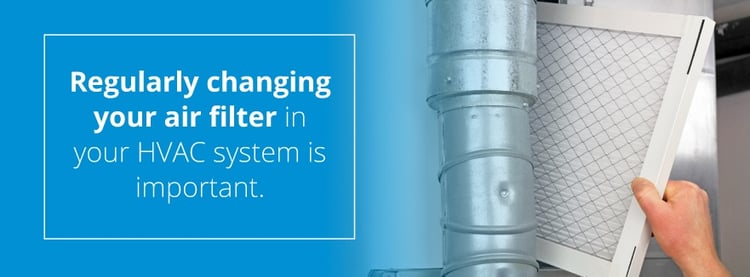
This is hard on your HVAC system, but it also reduces the amount of air moving through your home. Once again, air that isn’t moving will collect and retain humidity.
- Use exhaust fans while cooking. While most people will turn on the exhaust fan if their food is smoking, in the summer, you can also use this to vent moisture that is being released through steam.
You can also cover pots as they come to a boil. You will decrease the amount of time it takes for the water to heat while also trapping steam.
- Address a leaky pipe. Usually, we notice a leaky pipe when it starts to drip through the ceiling. Unfortunately, minor leaks may go unnoticed as the condensation that collects along the pipes evaporates before it damages drywall. While that’s good for drywall, that evaporated moisture remains in your home in the form of humidity.
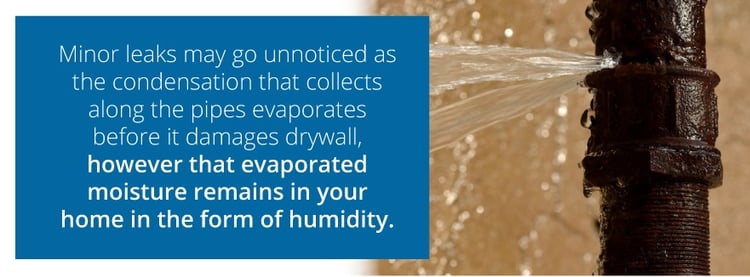
Another place to look for leaky, condensing pipes is in the basement. These leaks often do less damage since, if your basement is unfinished, there isn’t any drywall to damage. Even a dripping pipe can go unaddressed.
These pipes are sometimes uninsulated, which is another cause of condensation. If you have uninsulated pipes in your basement, a cheap DIY solution is to cover them with swimming pool noodles.
- Cover exposed house plant soil. While houseplants are a great way to improve air quality in your home while making it a more beautiful place to live, there is one negative side-effect: increased humidity.
Whatever moisture isn’t used by the plant as nourishment will evaporate through the soil surface. You can help combat this by placing burlap over the soil surface. Not only will this reduce humidity, it will also help the soil retain moisture, meaning you can water your plants less.
- Get your air conditioning serviced. A central air conditioning unit does more than provide you with cool air. It also helps keep your air dryer. However, as your air conditioner ages, it becomes less efficient. That’s why it's so important to perform regular maintenance on your air conditioning system.
Regular maintenance will lower your energy bills. A well-functioning air conditioner uses less electricity while also extending the life of your air-conditioning unit, thus saving you money on a costly replacement.
Because air conditioning units use dangerous coolants, it is important you have a professional check on these levels. You, as a homeowner, are responsible for maintaining and disposing of these chemicals properly. Failure to do so can result in significant fines. A professional service person will be able to take care of these step correctly.
Bigger Changes for Reducing Humidity in Your Home
Now that we’ve covered some smaller changes, let’s turn our attention to bigger ones. Some of these may require a professional and are best saved for those with big humidity issues. However, many also add value to your home while improving other aspects in addition to reducing humidity.
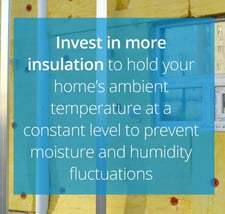 Invest in more insulation. You want to hold your home’s ambient temperature at a constant level to prevent moisture and humidity fluctuations. If you don’t have good insulation in your home, keeping temperatures level is difficult.
Invest in more insulation. You want to hold your home’s ambient temperature at a constant level to prevent moisture and humidity fluctuations. If you don’t have good insulation in your home, keeping temperatures level is difficult.
Luckily, good insulation does more than just help control humidity. During the winter, it will lower heating costs while reducing the need to run the air conditioner all summer long. Of course, this is a significant overhaul, so make sure new insulation makes sense for you.
- Waterproof basement walls. Because concrete basement walls are underground, they are susceptible to condensation from ground moisture. If you have a concrete basement, just go downstairs sometime during the summer and run your hand along the walls. It’s likely that they will feel damp, and that moisture will soon become humidity.
Luckily, there are certain products you can apply to concrete walls to make them waterproof. Just make sure they are appropriate for your particular foundation construction. Some older homes have foundations that cannot withstand the pressures of moistures differentials. This is especially true in older row homes commonly found in cities.
- Consider hardwood. While many people love the comfort of walking barefoot on carpeting, it does also retain humidity. Carpets are breeding grounds for mold, mildew and dust. If you are on the fence or have been looking for a reason to replace your carpet with hardwood, know this step can also help your reduce summertime humidity in your home.
Invest in Proper Dehumidifiers
Finally, let’s spend some time exploring the many types of dehumidifiers. While most people are familiar with dehumidifiers, there are different types designed for being used in different ways. A poorly matches dehumidifier will not perform as expected and may end up being a waste of money.
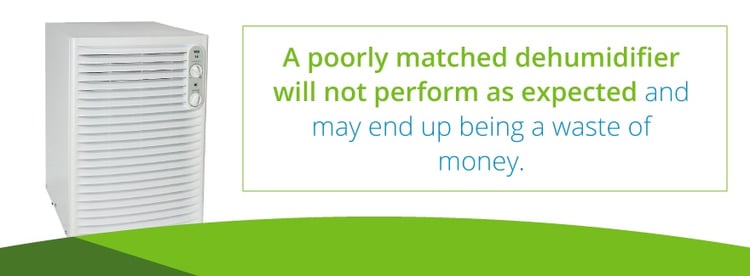
- Mechanical dehumidifiers. These dehumidifiers work in much the same way as an air conditioner. Warm, moist air is passed over a cooling metal plate. As the air cools, its ability to hold moisture is also decreased, thus causing the water to condense. That condensed air is then collected and removed. When the cooler air returns to the ambient surrounding temperature, it will do so while holding less moisture.
These are especially good for places with high humidity levels and warmer temperatures. They also come in a wide range of sizes, depending on your needs. You can also have a mechanical dehumidifier tied into your HVAC system, meaning your air conditioning will be dehumidifying your whole house as it runs.
The biggest advantage of a whole house dehumidifier is ease of use. Once you have it set up and running, you don’t have to worry about emptying water tanks nor do you need to install different units throughout your home. Your central HVAC system will dehumidify as it works. However, this is a larger investment, so it doesn’t make as much sense for someone who has an isolated humidity problem.
- Desiccant dehumidifiers. Rather than mechanically removing moisture, these dehumidifiers pass moist air across a substance that absorbs the moisture, such as a silica gel.
If you have humidity problems year-round, this is a good option, as it doesn’t produce liquid water that could then freeze. But they also aren’t quite as aggressive when it comes to removing moisture, so if you have a whole-house humidity problem, you may find them insufficient.
- Peltier dehumidifiers. These are best in smaller spaces. They aren’t as energy efficient as other dehumidifiers, but they are much quieter. That’s why people who need a dehumidifier in their bedroom are especially satisfied with these models. They are also excellent in bathrooms or even RVs if you need to take a dehumidifier on the road!
Work With Professionals Where Needed
When it comes to humidity in the home, you don’t always need a professional. Little fixes can go a long way! However, if humidity has become a consistent problem and the smaller changes haven’t fixed the issue, know that getting a professional involved can save you both time and money in the long run.
But you probably know by now that not all professionals are created equal! There are those in the industry who make big promises but don’t deliver. That’s why it is important to count on a licensed professional that you can trust.
Founded in Boston, MA, Smart Touch Energy has used its reputation for quality, customer-first service to expand throughout New England and the Mid-Atlantic. Whether you live in Maine, New Hampshire, Connecticut, Massachusetts, Rhode Island, Delaware, New York, New Jersey, Pennsylvania or Maryland, we provide unequaled service.
While our first goal is ordering and providing heating oil conveniently and for a low price, we have broadened our services to include A/C tune-ups and service.
We are experts on a wide range of HVAC issues, meaning we will address your humidity issue within the context of your entire home. While humidity is typically a summer problem, the changes you make can influence how your home warms during winter. By trusting us, you won’t discover some unwanted side-effect of the changes you’ve made later in the year.
We also know HVAC issues don’t come one at a time. When you partner with us, you can address a wide range of issues. If you are ready to tackle home humidity problems — or any other air conditioning or heating oil issue — look no further than Smart Touch Energy. Contact us and improve the comfort of your home today!



